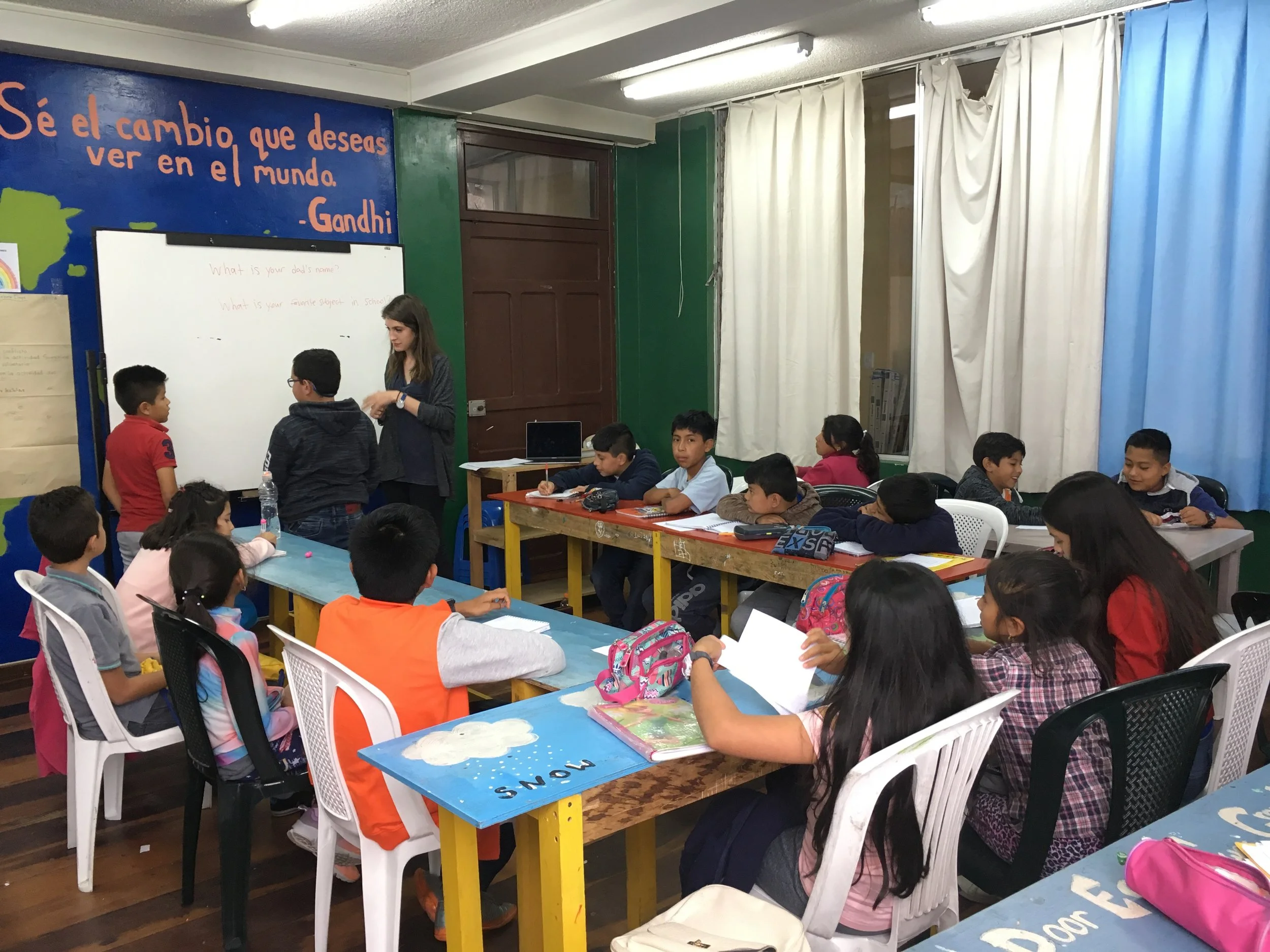By: Kate Clendenen
At Manna Project, we believe that everyone should have the opportunity to volunteer in Latin America, regardless of one’s Spanish proficiency. Volunteers of all levels of Spanish language abilities have worked and thrived at our sites. You will be able to experience all Manna Project has to offer no matter where you are in your Spanish, as long as you are willing to step outside your comfort zone and practice. We understand that a concern for potential or incoming volunteers may be speaking Spanish. We also realize that those who are already skilled Spanish speakers may not understand how coming to Ecuador could positively impact their Spanish. Therefore, as an effort to address these considerations, I’ve interviewed some of our Program Directors to give you the chance to learn from their experiences.
Gaby - Starting Level: Beginner
1. What was your Spanish like when you arrived?
I would definitely use the term “nonexistent”. I had never taken a formal Spanish class in school before or anything.
2. How did it feel to use your Spanish during the first week of being here?
It was really stressful at first because I didn’t know how to speak and couldn’t understand a single person. There was a really big learning curve--I relied on my fellow Program Directors a lot!
3. What was the biggest obstacle you faced, with regard to your Spanish use, during your first few weeks in Ecuador?
I mean, pretty much everything presented some sort of obstacle or challenge because I didn’t have any Spanish skills!
4. Can you share any funny or embarrassing Spanish fail moments?
In the beginning of the semester, when I was teaching my first kids’ English class, I learned the phrase “ojos por aca” which means “eyes over here”, but when I tried to use it for the first time I accidentally said “hojas por aca” which means “papers over here”. Right after I said the words, suddenly all the kids started walking up to me and handing me their papers. I was so confused.
5. How long did it take you to start feeling more confident in your Spanish?
It definitely took me a good few months. If I had to guess, I would say it took me more than 4 months to feel confident. However, it took me less time to start having a little fun with it. It stopped stressing me out a couple months in because I just came to accept where my Spanish was.
6. How would you describe your Spanish now?
I would say I’m probably at an intermediate level. I have high hopes for continuing to improve, but I’m still pretty proud of where I am now when I consider that I started out knowing NOTHING.
7. Can you describe a moment in which you remember recognizing how greatly your Spanish improved?
When I first started teaching my kids class I felt so bad because I couldn’t understand their questions so it was really a struggle. But by the middle of the quarter, I was finally able to understand and answer the questions with relative ease.
8. What advice do you have for people that plan to come to Ecuador with regard to their Spanish usage?
The only way to improve is to put yourself out there and really spend time with Ecuadorians. That is truly the only way that my Spanish improved. You also have to realize that people here want to learn English just as much as you want to learn Spanish. Our community members also really love helping you improve, so there is no reason to feel embarrassed. It helps a lot once you start to really keep that in mind.
9. What is the Spanish phrase you say the most often?
Chuta! It is the Ecuadorian version of “shoot” and it also usually gets a laugh out of the locals when they hear me using it.
Kelly - Starting Level: Intermediate
1. What was your Spanish like when you arrived?
It had been about 7 years since I had taken my last Spanish class, but my Spanish was fine. It was mainly my confidence that held me back.
2. How did it feel to use your Spanish during the first week of being here?
I actually enjoyed knowing that I would have ample opportunity to practice my Spanish. I chose to live in a Spanish-speaking country for a reason. However, I will admit that I still got nervous, especially in one-on-one Spanish conversations.
3. What was the biggest obstacle you faced, with regard to your Spanish use, during your first few weeks in Ecuador?
I was at a level of Spanish where I was constantly aware of the mistakes that I was making but, at the same time, there was nothing I could do in the moment to correct it--I just didn’t know those rules. Still, it was nice because I quickly came to realize the gaps in my knowledge which gave me the chance focus on improving those areas specifically.
4. Can you share any funny or embarrassing Spanish fail moments?
Often times, I won’t understand what someone is saying to me in Spanish. Then they’ll ask me a question in the middle of the conversation and it isn’t a yes or no question but my default is just to say “Uh-huh sí”--I always get a funny look back.
5. How long did it take you to start feeling more confident in your Spanish?
I would estimate two months to three months max.
6. How would you describe your Spanish now?
I would say that I am approaching a more advanced level. I also know what I need to do to take it to the next level, it’s just a matter of prioritization.
7. Can you describe a moment in which you remember recognizing how greatly your Spanish improved?
A mother of a child taking our English classes would hang out at our Community Center to chat with me while she waited for her daughter’s class to end. She was really interested in getting to know me so our conversations would run pretty long. When we first started having these conversations, I used to get pretty nervous because it took a lot of effort on my part to string together the right words. After a while, though, I remember there was this one time where I was speaking much more quickly and the words were coming out with a lot less effort. Even the mother made a point to tell me that she noticed my Spanish was really improving!
8. What advice do you have for people that plan to come to Ecuador with regard to their Spanish usage?
When you’re out in public--on the bus or in the grocery store, for example--it’s easy to tune out the Spanish because understanding it doesn’t come easily. I would highly recommend fighting this habit to take the easy route. It really helps to consciously make an effort to understand what people are saying--take notice of the tone and pronunciation. Think outside the box in terms of learning opportunities because there are way more than you would expect that present themselves every day.
9. What is the Spanish phrase you say the most often?
Nos vemos! It means “see you later”. It is always handy to have a nice way of saying goodbye.
Abigale - Starting Level: Advanced
1. What was your Spanish like when you arrived?
It was actually pretty good! I took Spanish classes in high school and undergrad. When I arrived to Ecuador, I had just finished a 5-month trip in Mexico where I took college-level classes that were taken by local Mexican college students and taught entirely in Spanish. I’d had a lot of practice.
2. How did it feel to use your Spanish during the first week of being here?
I felt fine, but it was a little rocky at first because I was familiar with a different dialect of Spanish.
3. What was the biggest obstacle you faced, with regard to your Spanish use, during your first few weeks in Ecuador?
A lot of the words I used were incorrect because Spanish dialects vary a lot more than I expected! Even with my level of experience with Spanish, I still found myself saying quite a few things slightly incorrectly.
4. Can you share any funny or embarrassing Spanish fail moments?
I would say my most common, recurring fail moment is calling kids “usted”. For those of you who are not familiar, there are two ways of saying “you” in Spanish: “Tu” is the informal way and that’s how you refer to friends or people who are younger than you. “Usted” is how you refer to elders or to strangers who you want to be polite to. Sometimes when I am trying to reprimand a kid in class I will accidentally call them usted, which immediately causes my words to land less effectively.
5. How long did it take you to start feeling more confident in your Spanish?
A couple weeks because, like I said, I’d been in Mexico for 5 months prior to my role with Manna so I mainly just had to adjust my dialect.
6. How would you describe your Spanish now?
It’s great! I’m really happy with how things are progressing! It’s really cool to be familiar with two different dialects.
7. Can you describe a moment in which you remember recognizing how greatly your Spanish improved?
Well, when I was in Mexico, I got really good at formal Spanish because that was the kind of Spanish we used in the college classes I was taking. Since being here, I have greatly improved in my more casual Spanish. I think a moment when I realized this was one night when I was out with friends in Quito and I had a long conversation with a native Ecuadorian friend. The slang and informal sentence structures were were coming to me pretty effortlessly. I remember noticing that I was able enjoy the conversation more because I felt like my Spanish was at the right level which allowed my friend and I to connect more naturally.
8. What advice do you have for people that plan to come to Ecuador with regard to their Spanish usage?
Take notice of the phrases that are common and practice using them yourself. This will enable you to connect with community members in a language style that they actually use rather than something you got from a book.
9. What is the Spanish phrase you say the most often?
Mande? This is the Ecuadorian version of saying “Excuse me?” or “What was that?” It has saved me a lot when I don’t quite understand what someone is saying to me! It is also cool because a lot of Spanish-speaking countries use “Como?” but “mande” is more unique to Ecuador.




